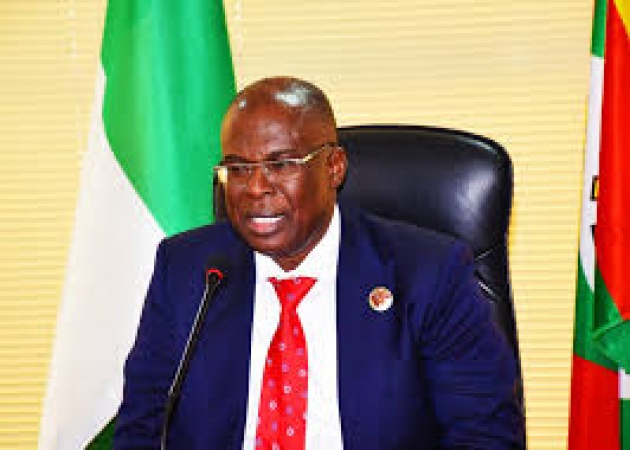By EDITH IKE-EBOH
The Minister of State for Petroleum Resources, Chief Timipre Sylva, says the National Gas Expansion Programme (NGEP) of the Federal Government will create two million jobs annually in the country.
Sylva disclosed this at the inauguration of the programme by President Muhammadu Buhari in Abuja on Tuesday.
He said the introduction of gas for the powering of automobile and other engines was a step in the right direction, adding it remained a cheaper and cleaner source of energy.
The gas products are Compressed Natural Gas (CNG), Liquefied Petroleum Gas (LPG) and Liquefied Natural Gas (LNG).
CNG is a cleaner alternative to gasoline and diesel fuels while Autogas is the common name for LPG when used as fuel in internal combustion engines.
The LNG is, however, a suitable option to power large long distance trucks.
“It is very important to note that this shift to gas underscores Mr President’s seriousness and determination in the development of Nigeria’ s vast gas resources.
“Under the directives of the president, we will continue to strengthen the gas value chain as it is vital to transforming the economy of our great nation.
“This initiative is envisaged to create 2 million jobs per annum, promote skills acquisition and enhance technology transfer in addition to growing the nation’s Gross Domestic Product (GDP),” he said.
He said that government was focused on delivering sustainable energy while ensuring gas availability and accessibility in the country.
This, he said, would help boost gas-based industrialisation and promote economic diversification, adding that his ministry had focused on implementation of the initiatives to drive home the directives.
He added that the current administration was dedicated to implementing programmes that would improve the life of citizens, create jobs and indigenous expertise and stimulate other sectors of the economy.
The minister further said that as a country, there was the need to think of long term strategies to grow the economy in real terms.
“A significant part of it is harnessing the gas resources to focus on manufacturing and productivity; not until this is done, we will not achieve the desired result.
“In January this year, I inaugurated a National Expansion Gas Programme as a mechanism to boost utilisation of natural gas in the short, medium and long term.
“This is also part of the Federal Government’s bid to key into global shift from crude oil to other alternative energy as emphasised in our declaration of the year 2020 as a year of gas.
“As part of roll out strategy which Mr President is unveiling today, selected stations across all 36 states and the Federal Capital Territory (FCT) will start the installation of facilities for gas products and conversion capabilities.
“The process is now well on course as you can see today.
“The availability of auto gas as an alternative will afford Nigerians cheaper, cleaner and additional choice of fuel, cheaper than the price of PMS, cleaner for our environment and better for our auto mobile and other engines,” he said.
He also commended the president for his firm leadership, other stakeholders and the patriotism shown by organised labour in the face of daunting economic challenges facing the country.
In his remarks, the Group Managing Director of the Nigerian National Petroleum Corporation (NNPC), Mele Kyari, said that the use of CNG and LPG had continued to get acceptance across the world for its low cost and impact on the environment.
He reiterated that it would provide cheaper alternative source of petrol for motorists in the country.
Kyari said that between 2016 and 2019, the Federal Government spent over three trillion naira subsidising the pump price of petrol in the country.
He said this never benefited the masses, adding that the economic effect of COVID-19 had made it impossible to continue with the subsidy regime.
The News Agency of Nigeria (NAN) reports that the high point of the event was the handing over of five buses that would be powered by CNG to organised labour by Sylva.
The buses would be used for mass transportation to help reduce the high cost of transportation occasioned by the hike in the price of petrol. (NAN)














